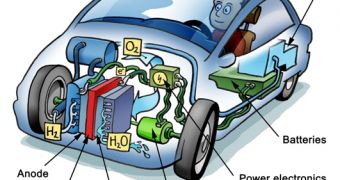Experts have found an innovative method that might make the prices of hydrogen cells decrease. Scientists agree upon the fact that the secret ingredient in this case is represented by Vitamin B12, meant to replace the current purpose of platinum, as a much more cost-effective catalyst.
A group of scientists from the Institute of Atomic and Molecular Science state they discovered a carbon-based catalyst and decided to load it with vitamin B12. The carbon-B12 revealed impressive results, although now it cannot beat the efficiency rate recorded by platinum.
As we speak, Vitamin B12 is considered a highly sustainable elements, as it has been already used as an appropriate catalyst for bacteria-based pollution cleanup operations that involve the presence of toxic compounds, according to Clean Technica.
While talking about the advantages of their discovery, experts say their research is on the right path. The team of scientists will start focusing their efforts on ways to expand the potential of carbon-B12. This strategy might require a significant timeline; yet, the anticipated effects reveal it is worth waiting.
The usage of fuel cells is limited by its own prohibitive costs. If scientists apply the technique meant to improve manufacturing processes and make it more affordable, their findings could be implemented on a large commercial scale.
Once this goal is achieved, the auto industry will no longer feel the tremendous pressure generated by fluctuating gas price, while helping car owners experience the benefits of an emission-free drive.
Another important consequence would imply that our planet's natural gas could no longer be exploited through dangerous fracking techniques, a controversial method associated with the presence of a significant amount of hazardous chemicals.
Innovating fuel cells represents one of the biggest challenges for researchers all across the Globe. As we speak, Lawrence Berkeley National Laboratory is relying on nanocrystals of titanium dioxide to decrease the cost of fuel cells, while Oxford University is currently trying to see if formic acid can provide encouraging results in the same field of activity.

 14 DAY TRIAL //
14 DAY TRIAL //